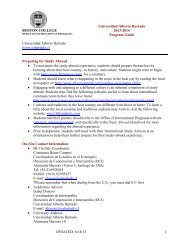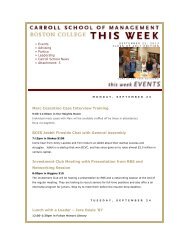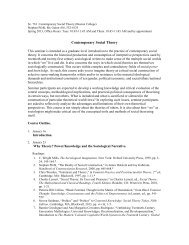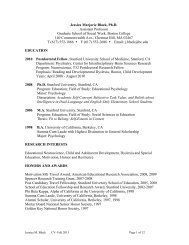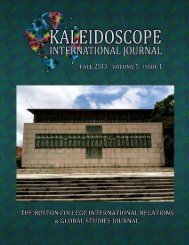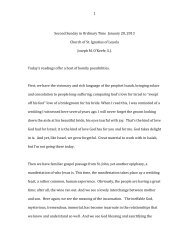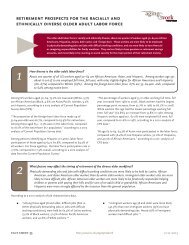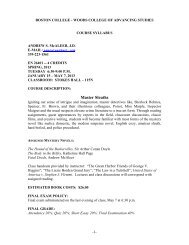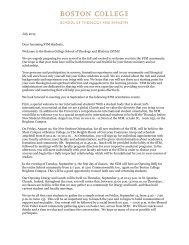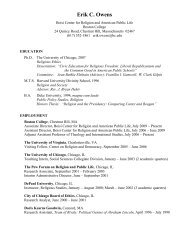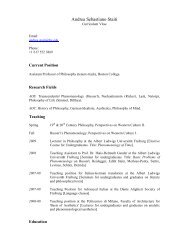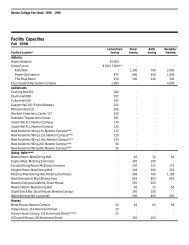separation of powers in thought and practice? - Boston College
separation of powers in thought and practice? - Boston College
separation of powers in thought and practice? - Boston College
You also want an ePaper? Increase the reach of your titles
YUMPU automatically turns print PDFs into web optimized ePapers that Google loves.
2013] Separation <strong>of</strong> Powers <strong>in</strong> Thought <strong>and</strong> Practice? 457<br />
The po<strong>in</strong>t is not so much about the oppressiveness <strong>of</strong> the exercise.<br />
A.V. Dicey illustrates his account <strong>of</strong> the importance <strong>of</strong> the rule <strong>of</strong> law<br />
with a story about Voltaire, who “was lured <strong>of</strong>f from the table <strong>of</strong> a Duke,<br />
<strong>and</strong> was thrashed by lackeys <strong>in</strong> the presence <strong>of</strong> their noble master . . .<br />
<strong>and</strong> because he compla<strong>in</strong>ed <strong>of</strong> this outrage, [he] paid a . . . visit to the<br />
Bastille.”89 Our outrage about Voltaire’s treatment fuels our anger<br />
about any lack <strong>of</strong> process <strong>in</strong> the matter <strong>and</strong> about the lack <strong>of</strong> legal recourse.<br />
But even if it were a deserved thrash<strong>in</strong>g, we would still want the<br />
exercise to be preceded (by a considerable length <strong>of</strong> time) by the enactment<br />
<strong>of</strong> a statute prohibit<strong>in</strong>g whatever it was that Voltaire supposedly<br />
did <strong>and</strong> threaten<strong>in</strong>g corporal punishment. We would want it also to be<br />
preceded by a judicial hear<strong>in</strong>g at which Voltaire could face his accusers<br />
<strong>and</strong> state his side <strong>of</strong> the matter, <strong>and</strong> by a solemn executive determ<strong>in</strong>ation<br />
that the sentence <strong>of</strong> the court was to be carried out <strong>in</strong> such-<strong>and</strong>such<br />
a fashion, <strong>and</strong> at such-<strong>and</strong>-such a time (e.g., after suitable opportunities<br />
for appeal). We would want the th<strong>in</strong>g to be slowed down <strong>in</strong> this<br />
way <strong>and</strong> for an orderly succession <strong>of</strong> phases to follow one another.<br />
Notice, therefore, that this is not necessarily a way <strong>of</strong> limit<strong>in</strong>g government,<br />
<strong>in</strong> the sense <strong>of</strong> curb<strong>in</strong>g its action, though I guess it could be<br />
described as a way <strong>of</strong> mak<strong>in</strong>g action more difficult by mak<strong>in</strong>g it more<br />
<strong>in</strong>volved. But the idea is to channel it, not restrict it, <strong>and</strong>, through the<br />
channel<strong>in</strong>g, to open up the decision mak<strong>in</strong>g for access by Voltaire or<br />
anyone else at various po<strong>in</strong>ts.<br />
As the Diceyan context <strong>of</strong> our illustration reveals, these concerns<br />
are <strong>in</strong> large part concerns associated with the rule <strong>of</strong> law.90 The rule <strong>of</strong><br />
law is not just the requirement that where there is law, it must be complied<br />
with; it is the requirement that government action must, by <strong>and</strong><br />
large, be conducted under the auspices <strong>of</strong> law, which means that, unless<br />
there is very good reason to the contrary, law should be created to authorize<br />
the actions that government is go<strong>in</strong>g to have to perform. This<br />
usually means an articulated process <strong>of</strong> the sort we have been talk<strong>in</strong>g<br />
about, so that the various aspects <strong>of</strong> law-mak<strong>in</strong>g <strong>and</strong> legally authorized<br />
action are not just run together <strong>in</strong>to a s<strong>in</strong>gle gestalt.<br />
We beg<strong>in</strong> with an action or type <strong>of</strong> action that it is envisaged the<br />
state may want to perform. We propose <strong>and</strong> deliberate upon the contours<br />
<strong>of</strong> that action as a matter <strong>of</strong> general policy <strong>and</strong> the formulation <strong>of</strong><br />
89 Dicey, supra note 14, at 112.<br />
90 Id. at 110. Dicey used Voltaire’s case to illustrate the first <strong>of</strong> his three pr<strong>in</strong>ciples <strong>of</strong><br />
the rule <strong>of</strong> law: “[N]o man is punishable or can be lawfully made to suffer <strong>in</strong> body or<br />
goods except for a dist<strong>in</strong>ct breach <strong>of</strong> law established <strong>in</strong> the ord<strong>in</strong>ary legal manner before<br />
the ord<strong>in</strong>ary Courts <strong>of</strong> the l<strong>and</strong>.” Id.



